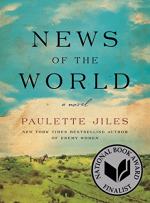
|
| Name: _________________________ | Period: ___________________ |
This test consists of 15 multiple choice questions and 5 short answer questions.
Multiple Choice Questions
1. Where does John Calley go to collect the herds that make him a wealthy man?
(a) Nebraska.
(b) Hill country.
(c) Indian County.
(d) Nueces strip.
2. When do Captain Kidd and Johanna leave Lampasas?
(a) Middle of the night.
(b) Mid morning.
(c) High noon.
(d) Before daylight.
3. What does Captain Kidd give the old lady he and Johanna meet, in a gig, riding back toward Durand?
(a) Money to pay for the chickens Johanna took.
(b) A letter for her to post.
(c) Dimes for John Calley.
(d) A letter for the mill owner they stayed with.
4. How does Captain Kidd sleep after the shootout at Carlyle Springs?
(a) Restlessly, on edge about the Caddos.
(b) Badly, tormented by old nightmares.
(c) Peacefully, without war nightmares.
(d) Fitfully, as they forge ahead on the road.
5. Where does Johanna take refuge, while she travels with the Captain into the hill country?
(a) In the Captain’s bit hat.
(b) In the red wool jorongo, or serape.
(c) In the floorboards of the Curative Waters wagon.
(d) In the Captain’s jacket.
6. How does the Captain discern that the figures crossing the river are Kiowa?
(a) By their vocabulary.
(b) By their sign language.
(c) By their dress.
(d) By their hair.
7. How does Captain Kidd surprise the Mexican women washing clothes in Alazan Creek in San Antonio?
(a) By joining them in their washing.
(b) By recognizing some of them.
(c) By calling out saucy things to them.
(d) By answering their saucy things in Spanish.
8. When Captain Kidd and Johanna encounter the patrol in the road to Durand, how does Captain Kidd avoid answering the question put by the Captain, about who he voted for, for governor?
(a) He claims not to speak English.
(b) He says he is offended.
(c) He pretends not to have heard.
(d) He says he was not in the state at the time.
9. Where does Captain Kidd park the Curative Waters wagon when he reaches Durand?
(a) A field on the edge of town.
(b) A stave mill.
(c) A hotel.
(d) A tavern.
10. What dance does Johanna do in the wagon, as she and Captain Kidd make their way south from Cranfills Gap?
(a) Cicada dance.
(b) Grass dance.
(c) Sun dance.
(d) Rabbit Dance.
11. Where does Johanna sleep, for her first night back with her aunt and uncle?
(a) In the Curative Waters wagon.
(b) On the floor.
(c) On a plank.
(d) In a bed.
12. How does Captain Kidd characterize the white man’s world he wants to protect Johanna in?
(a) Cross-grained and contentious.
(b) Side-ways and inside-out.
(c) Upside-down and topsy-turvy.
(d) Mechanized and cruel.
13. What does Captain Kidd look for in the tight spirals of buzzards?
(a) Signs of a dead body nearby.
(b) Signs of other travelers.
(c) Signs of game nearby.
(d) Signs of water.
14. How does Captain Kidd know that he and Johanna are under attack?
(a) The stove erupts with a bullet shot.
(b) The wagon rocks with bullets.
(c) The leaves overhead are torn by bullets.
(d) The dirt at their feet is kicked up by bullets.
15. What does Johanna do when the Captain stops at Carlyle Springs?
(a) Hide the wagon with brush.
(b) Lead the horses further from the road.
(c) Load the guns.
(d) Cook breakfast.
Short Answer Questions
1. What does Captain Kidd have to prevent Johanna from doing, at the end of the shootout at Carlyle Springs?
2. What is Captain Kidd concerned with, as he descends from Carlyle Springs?
3. Who is the author of the quote Captain Kidd quotes to John Calley, that the laws should be publicized openly, and apply equally to king and peasant?
4. What does the narrator say about Johanna’s reintegration into American culture?
5. How does Johanna injure one of the Caddos with Almay?
|
This section contains 670 words (approx. 3 pages at 300 words per page) |

|




